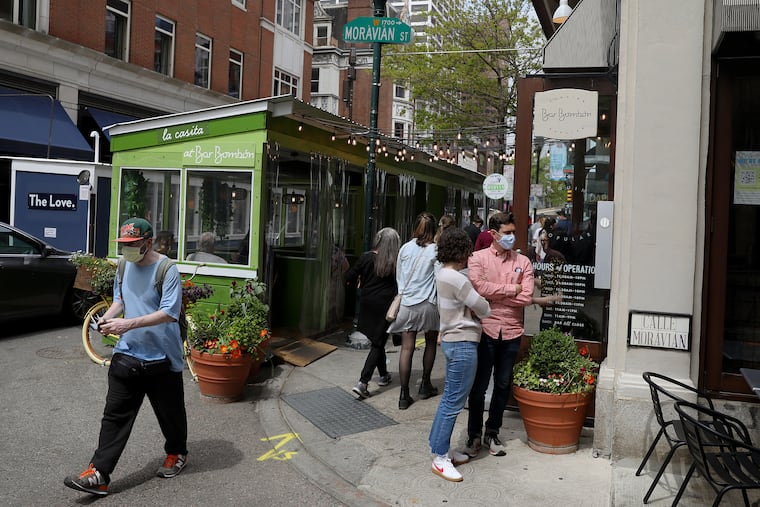Restaurants left out of Philly’s ‘streeteries’ legislation worry it will be impossible to get approval
City Council is expected to pass a bill in December making outdoor dining structures permanent in the city, but only in some areas.

Outdoor dining at Stina Pizzeria in South Philadelphia, with a shelter and electric heaters built on what had been parking spaces, has kept the business alive during the pandemic.
“If we didn’t have our ‘streetery’ right now … the revenue would just not be enough,” said owner and chef Bobby Saritsoglou, who estimated that 80% of his business is customers eating alfresco at the Snyder Avenue restaurant.
As the city’s pandemic approval for expanded outdoor dining is set to expire at the end of the year, proposed legislation would grant permanent permission to restaurants’ dining structures in large swaths of the city — but not for Stina’s.
Stina Pizzeria is one of many restaurants that are located outside boundaries set by City Council legislation that advanced this month. In order to continue serving food in parking spaces, a restaurant outside the designated areas would need to seek individual legislation.
To Saritsoglou, seeking out that approval sounds “impossible, probably.”
The creation of two separate systems, with by-right streeteries for some areas and Council approval needed for others, came after Councilmember Darrell L. Clarke expressed opposition to a proposal from Councilmember Allan Domb that would have made the expanded outdoor dining permanent across the city.
Clarke said that would take power away from Council members, who typically have control over land-use decisions in their own districts. A similar two-track system, with blanket approval for only some areas, existed for sidewalk cafés before the pandemic. But additional legislation advanced this month would approve sidewalk cafés citywide through 2022. City Council is expected to vote on both bills in December.
» READ MORE: Outdoor dining could become permanent in Philly — but only in certain areas
Clarke and Domb compromised, allowing district Council members to decide which portions of their district could have streeteries. The results vary: Some districts would allow streeteries on just one street, while Councilmember Jamie Gauthier included her entire West Philadelphia district in the legislation.
“They just kind of asked us, What part of your district do you want there? And for me it was a really easy answer: the whole thing,” Gauthier said.
Other district Council members are poised to approve streeteries in Center City and on busy commercial corridors such as on Main Street in Manayunk and in business improvement districts representing East Passyunk, Fishtown, and Northern Liberties.
The legislation has safety and accessibility restrictions that weren’t included in the emergency pandemic approval. The structures can’t be in front of adjacent properties, for example, can occupy parking spaces but not travel lanes, and must be a certain distance from stop signs, crosswalks, fire hydrants, and traffic lights. That means many streeteries within approved boundaries will have to change their setups to comply.
“While we’re happy that Council is still willing to have this conversation … we’re not yet sure really how some of the changes will impact our members,” said Zak Pyzik, director of government affairs for the Pennsylvania Restaurant & Lodging Association.
Gauthier said expanded outdoor dining has helped businesses and created a more vibrant atmosphere in the city. And she said she was concerned about equity.
“I didn’t want to have winners and losers across my district,” she said.
Peggy Zwerver has one restaurant that falls into the approved areas and one that doesn’t. She and husband Tom Baker own Earth Bread + Brewery in Mount Airy and co-own Bar Hygge in Spring Garden with partners Stew and Julie Keener.
Bar Hygge, on Fairmount Avenue, falls into an approved area. Zwerver said dining in parking spaces, including in huts the restaurant set up and decorated, has been popular.
At Earth Bread + Brewery, Zwerver applied for a streetery license last year but never built one, she said, in part because of the uneven cobblestones in front of the restaurant. If the new legislation passes, she would need Council approval to have dining in the street.
“I don’t understand why it would be OK for certain neighborhoods and not all,” she said. “Doesn’t seem fair.”
Domb, who preferred allowing streeteries citywide, said he’s likely to alter the bill before passage to include requirements for architectural review of the structures and other technical changes, but the concept of designated boundaries will remain.
“The most important part of this is that we emerge from the pandemic better than yesterday,” he said, “and with new fun and exciting things for people to do in the city.”
Saritsoglou, of Stina Pizzeria, said he’s concerned that “only the really affluent areas” get to have streeteries. His restaurant is in Councilmember Kenyatta Johnson’s district, and Saritsoglou said he had previously tried to contact Johnson’s office about outdoor dining earlier in the pandemic but had no luck reaching anyone.
Vincent Thompson, Johnson’s communications director, said Tuesday that streeteries will be permitted in the Center City portion of the district, but not the residential neighborhoods. But he said he reached out to Saritsoglou to assist him after hearing of his situation. Johnson “routinely accommodates” requests like those that restaurants will require to keep their dining setups, Thompson said.
“Hopefully there’ll be some information for us to be able to do that,” Saritsoglou said.